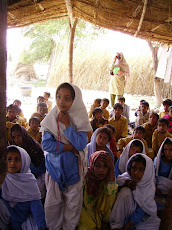A View from CSW
Exhausting, challenging excited- a visit to the CSW in New York. Miles of Corridors to negotiate, correct conference room to find and this year a massive fall of snow which made crossing the street somewhat dangerous as we negotiate slush, piles of snow and ice. How refreshing to meet with so many young involved girls, many belonging to World Wide Association of Girl Scouts and Girl Guides (WAGGGS) Sharing breakfast with them this morning we learned about their advocacy work on HIV/AIDS. We then played a game from their AIDS awareness pack: By shaking hands, I was able to infect 6 other people in 5 minutes as I had drawn a card saying I was HIV positive. Of course this activity was designed to "demystify" some of the myths about HIV transmission and leads to a discussion about how HIV can be transmitted- NOT by shaking hands. This demonstrated the ease and speed with which the virus can be spread. Half an hour rest to write this bit for the blog. Sandwich in hand-off now to the main session for a panel discussion in the main theatre. Hilary Ratcliffe- SI Great Britain and Ireland Programme Director
Emerging Issue: Gender Perspectives of the Financial Crisis
The following statement will be presented this week at CSW as an issue affecting all of it. Patti Dolan, SI member in Canada
The Commission on the Status of Women (CSW) has selected the emerging issue, "Gender Perspectives of the Financial Crisis" as the subtheme of the 53rd session of the CSW. There has been increasing concern among women’s organizations, networks and agencies about the impacts of not only the global financial crisis but the food, fuel and climate change crises on women. Gender advocates are looking at how to engage in further dialogue with the key political players and at key moments to ensure policy proposals include a gender perspective in the solutions of the global crises.
How is the global financial and economic crisis impacting development?
The impact of the financial crisis is affecting the whole world and is threatening long term objectives like the achievement of the Millennium Development Goals .
Not only the developed countries, but increasingly emerging economies and least developed countries are suffering the effects of this global financial crisis.
Financial markets have collapsed, lending and investments opportunities are declining and exports are falling as demand decreases.
In addition, developing countries, facing already higher food and energy prices, lack the means and resources to protect their financial institutions or banks from bankruptcy.
The results are falling stock markets, rising interest rates, and less government resources for socio-economic investments that benefit the poor.
How is the global financial and economic crisis affecting women?
Women’s jobs tend to pay lower wages, in part because women tend to have a higher rate of part-time employment, and are often not covered by social safety nets. Moreover, in countries without social safety nets, the impact on women is even more severe.
Employment losses or a slowdown in job growth is expected to contribute to growing unemployment. This finds women at the risk of being hired last and dismissed first.
Developing countries will be affected by the drop in remittances from family members in developed economies. Remittances give women greater autonomy and control over family matters.
Female-headed households are at greatest risk, with few if any savings to weather the crisis, and limited ownership of wealth and other assets, as compared to men.
Ethnic groups that are less powerful and immigrant groups will suffer in many of the same ways because they are similarly situated in the paid economy as women. Even in developed countries such as the US, Black and Latina women face particularly high rates of poverty.
The effects on women and therefore children will be transmitted through cuts in public sector budgets, due to falling tax revenues and foreign aid.
As food and fuel prices soar and adding stress and hardship to families, incidents of violence against women and communal violence increase.
What are policy and advocacy inputs to improve the situation for women?
Past experiences have shown that financial crises and neoliberal policy responses, such as Structural Adjustment Programs, have disproportionately affected women in negative ways. It is critical to recognize gender equality as a fundamental human right and an issue of social justice essential for economic growth, poverty reduction, environmental sustainability, and development effectiveness.
New indicators must be developed to measure the impact of gender inequality on economic growth by measuring the value of women’s unpaid work as well as by developing performance indicators to measure progress in introducing and implementing gender-responsive approach to public finances.
To be efficient, effective, and accountable, public finance management systems and practices need to support rather than undermine principles of participatory and gender-responsive budgeting.
Information and resources
This information sheet primarily referenced the following papers and websites:
Interactive expert panel: Gender perspectives of the financial crisis, Issues Paper, 2009.
www.un.org/womenwatch.org Center for American Progress
www.americanprogress.org/issues/2008/10/women_poverty.html/ "The Straight Facts on Women in Poverty," 2008. Commission on the Status of Women 53rd session, Agreed Conclusions
http://www.un.org/womenwatch/daw/csw/53sess.html
Excerpts from Written statement submitted by Stephanie Seguino for the interactive expert panel on the "Emerging Issue: Gender perspectives of the financial crisis" at the CSW on 6 March 2009.
Tuesday, March 3, 2009
Subscribe to:
Post Comments (Atom)







No comments:
Post a Comment